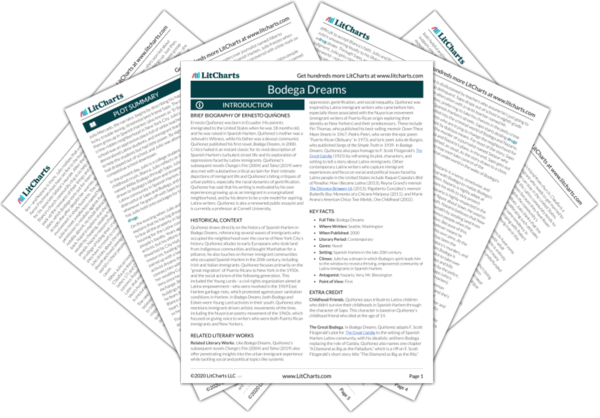Ernesto Quiñonez’s Bodega Dreams, set in New York’s diverse urban landscape of the late 20th century, argues that wealth and crime are inherently connected. An ex-activist named Bodega and a lawyer named Nazario utilize the criminal underworld to fund their dreams of empowering the Latinx immigrant community in Spanish Harlem. They use illicit funds—acquired from drug deals and dangerous mafia involvement—to buy property for the community, fund the education of promising Latinx youths, and promote upward mobility in the disenfranchised corner of Manhattan they call home. But many of the story’s other characters—especially narrator Julio’s young, religious wife, Blanca—condemn illegal activity. However, to Quiñonez, Bodega and Nazario act no differently than the city’s powerful white elite. Politicians effectively commit the same, albeit technically legal, crimes by “signing pieces of paper” that steal land and resources from indigenous communities to favor the upward mobility of their own people. The city’s marginalized immigrants, on the other hand, are forced to turn to illegal crime to better their communities because they have no other resources available to them. Quiñonez thus implies that oppressed people with limited options might need to break the law to enact social change, but if their cause is worthy, their actions are justified.
Through the voice of savvy lawyer Nazario, Quiñonez argues that Bodega and Nazario’s underground activities are no more immoral than those of the city’s white political elite, who also stole to acquire their wealth. Nazario argues that America’s first colonizers stole land from indigenous people and committed violent crimes to acquire their wealth. Nazario says that such colonizers took “shady steps,” such as depicting their colonizing actions as “Manifest Destiny” (the idea that their westward expansion was inevitable and therefore justified) to disguise heinous crimes like the genocide of Native Americans. Similarly, Nazario argues that powerful people acquire wealth by exploiting others using sly methods—like sneaky legislation—that aren’t available to disempowered communities. Nazario says, “The day will come when, just like the white guy, we will also steal by signing the right papers.” Here, Nazario implies that the political elite use their power to disguise their theft as legal business activity, but their actions are no less criminal.
As the story progresses, Julio, the story’s narrator, ultimately reasons that Bodega and Nazario’s actions are not immoral, but justified—because their cause is noble, their options are limited, and their actions are no different than the city’s elite. Julio’s wife, Blanca, argues that illegal activity (like stealing) is categorically wrong because the powers that be say so, but Julio questions this perspective. He reasons that Bodega and Nazario aren’t wrong, because they act no worse than the powerful people in New York, and their vision is for the good of the community. Julio notes that Bodega and Nazario are really no different than the “Anglo” (non-Hispanic white people): in buying up and renovating cheap property for the community, they steal “by signing the right papers,” just like politicians who starve the Latinx community of funds through bogus legislation. Recalling that the Americas were founded by colonists striking cheap bargains, Julio argues that Bodega and Nazario are effectively just “buying the island back at the same bargain rate” from the white communities that colonized them in the first place. Julio ultimately decides that he can support Bodega and Nazario because their goal is defensible: they’re fighting to free the community from oppression, stave off white gentrification, and “create new hope for the neighborhood.” Quiñonez effectively argues—through Julio’s gradual acceptance of Bodega and Nazario’s illicit activities—that communities marginalized by the dubious political activities of wealthy people are justified in empowering themselves by any means available to them. In the end, their crimes are no different, and therefore no worse, than the thievery of their oppressors.
Crime, Wealth and Activism ThemeTracker

Crime, Wealth and Activism Quotes in Bodega Dreams
“The next day we went to City Hall and filed our demands. And you know what happened the next month, Chino? […] The next month, they hiked the subway fare from twenty-five cents to thirty-five cents. […] So we waited, and we waited, and we filed and we filed. Finally, when we knew our demands weren't going to be met, when we knew […] the sanitation department wouldn't even lend us brooms to clean our streets, we had no choice but to take over the streets of East Harlem.”
“Look around, Julio. Every time someone makes a million dollars, he kills some part of the world. That part has been us for so long, and it will continue to be us unless we fight back. The day will come when, lust like the white guy, we will also steal by signing the right papers […] What do you think, it comes from nothing? America is a great nation, I have no doubts about that, but in its early days it had to take some shady steps to get there. Manifest Destiny, that was just another word for genocide.”
That night Sapo dropped me off at one of the new-old buildings Bodega had renovated on 116th and Lexington. Those buildings had been condemned for years. The City of New York takes so much time to either renovate or bulldoze a condemned building it’s like those guys on Death Row who die of old age rather than execution. Bodega had bought the entire row from the city and had slowly renovated three of them. He had improved the block. Improved the neighborhood. Given people a place to live.











